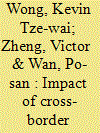| Srl | Item |
| 1 |
ID:
172510


|
|
|
|
|
| Summary/Abstract |
The policy of the European Union, which promotes a vision of Europe without borders and has fostered the development of cooperation across borders over 25 years, has led, in some parts of Europe, to the emergence of so-called integrated cross-border regions. Thus far, the increase of cross-border flows and interactions has always been a normative and almost unquestioned policy paradigm. However, tendencies of re-bordering and signs of growing Euroscepticism can also be observed nowadays in these border regions, which show the importance of investigating the negative externalities that can be generated by cross-border integration. This article attempts to do this by focusing on three case studies usually considered as among the most integrated ones in Europe because of cross-border flows related to work: the cross-border metropolitan regions of Basel, Geneva and Luxembourg. Our findings show that if several decades of cross-border integration have led to the reinforcement of the functional linkages between the border regions, some effects of the cross-border integration process have also created a functional specialisation of space that relies on social and economic inequalities. Such a situation contradicts the ideal of cross-border territorial cohesion and helps to better understand the rise of Euroscepticism in some of the border areas.
|
|
|
|
|
|
|
|
|
|
|
|
|
|
|
|
| 2 |
ID:
149754


|
|
|
|
|
| Summary/Abstract |
Using official statistics and a pooled dataset of longitudinal surveys, the aim of this article is to examine the impact of the Individual Visit Scheme (IVS) on political trust in Hong Kong. Our multilevel analysis found that the gradual inflow of IVS visitors (mostly overnight visitors) increased political trust in the first few years, but that this trust rapidly diminished in later years, especially after the introduction of the one-year multiple-entry IVS endorsement (which attracted mostly same-day visitors). The main reason for the reduction in the positive impact of the IVS scheme is that the growth in the number of same-day visitors has contributed less to Hong Kong's economy than has the increase in the number of overnight visitors, and has exacerbated several social problems. The impact of mainland visitors has varied across groups with different levels of education. The political trust of people with a senior secondary education has been enhanced more by the increase in overnight visitors and reduced less by the increase in same-day visitors than that of people with a tertiary level of education or a junior secondary education or below.
|
|
|
|
|
|
|
|
|
|
|
|
|
|
|
|